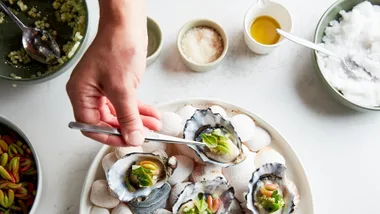At Manuel’s in San José del Cabo, Mexico, the chef offers cream of cauliflower soup with tempura shrimp, warm beetroot gelatine, beetroot air and hazelnut oil, and sea bream fillet with potato cream infused with squid ink, topped with saffron foam. The menu at Varvary in Moscow includes spherified borscht and pelmeni in chicken-broth emulsion with beetroot-horseradish ice-cream. Among the dishes offered at Kim’s Kafé in Pyongyang, North Korea, are radish-flour noodles with chocolate-kimchi truffles, and air-dried dog wrapped in lotus-root paper with pine-cone mayonnaise.
Just kidding about that last one, actually, but, hey, how could you tell?
Ferran Adrià, chef and co-proprietor of the legendary El Bulli on the Catalan coast of Spain, has changed the way chefs all over the world cook – which means that he has changed the way we eat, which will almost certainly one day change the way we cook at home. There is definitely a sense that he has reinvented food.
Of course, there was nothing wrong with food in the first place. Some might say Adrià should have left well enough alone. Why “spherify” an olive (treating olive juice with calcium carbonate and alginate solution so that it forms spheres of liquid enclosed by skins of the same liquid) when plain old olives as provided by nature and cured by humankind are so damn good? What makes a foam of fresh tomatoes better than a sauce?
When critics of Adrià pose questions like these, they miss the point. Chefs have always altered raw materials; they have always played with molecular structures. It’s their job to transform ingredients, to turn them into something more elaborate or delicious or benevolently deceiving than they were in their native state. That’s what makes food into cuisine. All Adrià has done is expand the possibilities. He has brought into the kitchen materials and machines that used to stop at the pharmacy or workshop door. He has looked at all the known ways of treating a foodstuff to make it edible and attractive and then asked himself and his team, “Now, what else can we do with it?” What he has introduced to haute cuisine isn’t science; it isn’t chemicals or space-age technology; it’s unfettered imagination.
Adrià has certainly developed or found new applications for numerous techniques that have become immensely popular in serious restaurants. Foams and airs, spherified liquids, savoury ice-creams, warm gelatines, edible paper, noodles made out of liquids, solid food turned into evanescent essences… If you encounter any of these when you go out to eat, you have Adrià to thank (or curse, if you’re so inclined), at least indirectly.
But beyond this sleight of hand, it was Adrià who first began turning soups into salads (as with his solid gazpacho), and who first had the idea of “deconstructing” familiar dishes, breaking them down into their constituent parts, changing the physical identity of these parts, and then reassembling them in new ways. (One of his first ventures involved recasting chicken curry as curry ice-cream with chicken sauce, apple gelatin and coconut soup.)
Adrià was one of the first, too, to decree that all foodstuffs had equal value and to introduce “common” ingredients into fine cooking (Spanish gastronomes turned up their noses at first when he served “peasant food” such as sardines and sea urchins). It was he who, taking his inspiration from the tapas tradition he loves, began to blur the line between entrée and main course. Then he went on to break down the barrier between sweet and savoury, between pastry and the courses that have traditionally preceded it. His message seemed to be: good food is good food; make it any way you can, and chefs in every corner of the globe heard it.
“Since Ferran,” the avant-garde Milanese chef Carlo Cracco has said, “every chef has felt free to create new things.”
*United States author Colman Andrews is recognised as the English-speaking world’s authority on Catalan food; he first interviewed Ferran Adrià more than a decade ago.**Colman Andrews examines Ferran Adrià’s astonishing career and its impact on the culinary world in Reinventing Food Ferran Adrià: The Man Who Changed the Way We Eat (Phaidon, $39.95, hbk).*
 COURTESY OF EL BULLI ARCHIVES
COURTESY OF EL BULLI ARCHIVES









